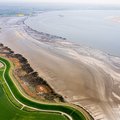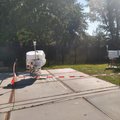Latest news
02 July 2020
Bricks made out of mud and cow-dung to regulate indoor climate

During his research career, Yask Kulshreshtha has been on a quest to invent new building materials that are affordable, locally available and help to reuse organic waste materials. He has for instance developed solutions to make traditional mud houses in rural India water resistant.
30 June 2020
Historic floods reveal how salt marshes can save lives in the future

Coastal wetlands like salt marshes are increasingly recognized as valuable natural defenses that protect coasts against strong wave attacks.
23 June 2020
New measuring equipment accurately maps out the atmosphere above the TU Delft Campus

A compact and mobile cloud radar will deliver high resolution images of the cloud compositions above the TU Delft Campus.
11 June 2020
Help from an unexpected quarter: geosciences data techniques can help predict corona spread

An international team of scientists is studying the possibility of using data assimilation, a data technique from geosciences, to predict the spread of coronavirus and the efficacy of certain measures. TU Delft geoscientists on the team think that data assimilation might prove a useful tool for the RIVM epidemiologists. A paper on the subject has been submitted to scientific journal Foundations of Data Science.
02 June 2020
Efficiency and Safety in Geothermal Operations

A fund of 3.4M€ has been awarded by the European Commission to a project on geothermal energy, that will be led by researcher Maren Brehme (TU Delft). The project entitled ‘EASYGO: Efficiency and Safety in Geothermal Operations‘ is one of the Innovative Training Networks meant for extraordinary global research as well as excellent training opportunities for PhD candidates to reach doctorate level.
02 June 2020
TU Delft launches first eight TU Delft AI Labs

How can artificial intelligence (AI) accelerate scientific progress? Delft scientists will investigate this question in eight new 'TU Delft AI Labs'.
28 May 2020
Technologies for the transition phase

After worldwide lockdowns due to COVID-19, many countries are on their way to 'the new normal'. To investigate and shape our new normal we need vetted data and models combined with profound knowledge about digital technologies and systems. On the new website ‘COVID-19: Technologies for the transition phase’ researchers from Delft University of Technology share their knowledge and expertise to help shape a responsible transition to the new normal in the critical years that lie ahead. Serge Hoogendoorn, professor Traffic operations & management, is one of the initiators. Many researchers from the department of Transport & Planning have already contributed.